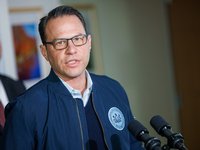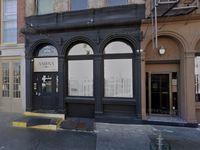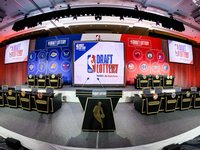Democratic presidential candidate Hillary Clinton says she is "very supportive" of Philadelphia Mayor Jim Kenney's proposal to levy a tax on sugary beverages in order to fund universal pre-kindergarten, part of a $4.17 billion 2017 budget plan revealed last month.
Clinton, who appeared in Philadelphia on Wednesday for a pair of campaign stops, told a forum hosted by the Mothers of the Movement – a gun control advocacy group – that she wants to see the "school to prison pipeline" replaced with a "cradle to college pipeline," according to CNN.
"It starts early with working with families, working with kids, building up community resources – I'm very supportive of the mayor's proposal to tax soda to get universal pre-school for kids," Clinton said. "I mean, we need universal pre-school. And if that's a way to do it, that's how we should do it."
Kenney's proposal calls for a three-cent per ounce tax on sugary drinks in order to raise approximately $95 million in additional tax revenue for Philadelphia and promote improvements in public health. The plan requires approval by City Council and would represent the highest tax of its kind in the United States. Only Berkeley, California, has successfully passed a soda tax at a significantly lower rate of one cent per fluid ounce.
- Related Articles
- Drexel researcher makes case for Kenney's soda tax
- A soda tax to fund pre-K and city parks? Seems fair to me
- City officials: Tax could reduce sugary drinks consumption by 55 percent
Overall, Mayor Kenney's budget calls for $256 million dollars for a pre-K program intended to serve 25,000 children in Philadelphia.
"The problem is that big soda charges our citizens, small businesses and distributors much, much more than what it costs them to make the soda," Kenney said in March. "And then, they use some of these profits to fund lobbyists, who come here and say that a tax on sugary drinks will cost jobs and devastate small business."
Four years ago, as a member of City Council, Kenney voted against former Mayor Nutter's soda tax proposal, which drew more than $238,000 in opposition from the soda lobby. At the time, Kenney said the proposal might hurt low-income families and minorities, but he now believes the proposal would have a limited impact on the job market and communities.
Clinton appeared later Wednesday evening at The Fillmore in Fishtown, where supporters said her experience and pragmatism make her the best candidate to represent the Democratic party. In advance of the April 26 primaries in Pennsylvania and four other states, Clinton owns 1,446 delegates and has the support of another 502 superdelegates, according to the New York Times. Rival Bernie Sanders has collected 1,200 delegates and is backed by 38 superdelegates, who can switch allegiances in July at the Democratic Convention in Philadelphia.






